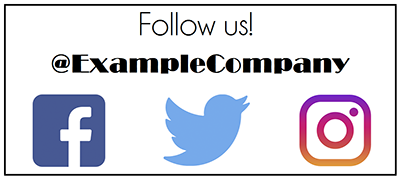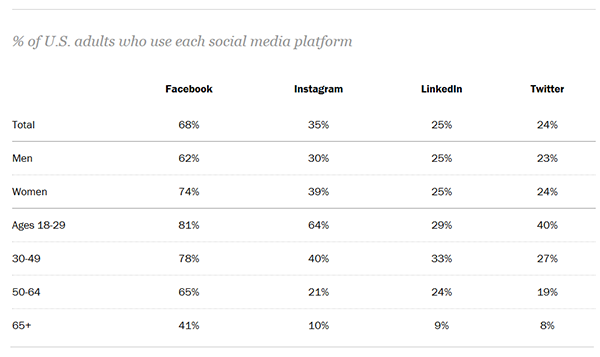Having a great website is the foundation for your business to have an effective online presence. However, you shouldn’t underestimate the potential of bringing in new clients through social media. Other than paying for social media ad campaigns, there is a lot you can get done on your own for free. If you don’t use social media much personally, you might not know where to start in using it for your business. To give you a starting point, here are three key elements of building your social media presence.
Choose the Right Platforms
The first step, of course, is deciding in which social media platforms you want to invest time and money. The best platforms for your business will depend on the demographic you’re hoping to reach and the type of media you’re hoping to share.
If you are hoping to appeal to a specific audience, prioritize your platforms based on their user demographics. A quick search on statistics, like this data from Pew Research, will help you decide which are the best for your business. The most used platform across all demographics is Facebook, so it’s a safe bet for all businesses. Twitter, however, wouldn’t be a very effective platform, if your service or product is geared toward older adults.
You should also consider the features available on each platform.
- Facebook has a wide range of features, with the option to post text, pictures, videos, polls, links, event pages, and more.
- LinkedIn, arguably the professional version of Facebook, also has a comparable wide range of features, but with far fewer users.
- Instagram is ideal for pictures and videos, but doesn’t allow you to share clickable links in your posts.
- Twitter allows you to share pictures, videos and clickable links, but you’re limited to 140 characters per post.
Think about the type of media that is most relevant to your business and determine which platforms are the best fit.
Select the Best Username and Hashtags
A username is simply the name on your profile. Most businesses just use their company name, with their logo as their profile image. You’ll ideally want to choose a username that is available on every platform you use. Sharing one username that applies to all platforms will simplify sharing your social media info to your audience, like the example image here. 
If your company name is long or isn’t available, you might want to consider a slight adjustment. For example, a business called “The Pill Company,” might want to pick a more concise username like @ThePillCo.
Hashtags are also an extremely important part of social media. Hashtags help your posts be discovered by people who don’t follow you yet. A hashtag is any word (or group of words, not separated by a space) that starts with the “#” symbol. This makes the word clickable and searchable. Any publicly shared post with the same hashtag will be grouped together. Choosing a popular hashtag can help your business profile be discovered by potential leads. To get ideas, look around at what hashtags other businesses in your industry use.
Post Relevant Content Frequently
As you get ready to grow your list of followers, hashtags can increase your visibility, but quality and frequency are key. To decide what to post, take a step back to consider what kinds of posts you would want filling your own feed every week. Posts should be appealing, relevant and helpful to your audience. If your content consistently feels like advertisements, you’ll likely have a hard time maintaining followers. Think carefully about what to post that is relevant to your business, but also valuable to your target audience.
How often you post is also a really important part of building your social media presence. A scarce profile with only a few posts will look incomplete. Posting too frequently or multiple times in one setting could annoy followers. Determining how frequently to post depends on the platforms you’re using and the content you’re sharing. Posting to Twitter multiple times a day is common, but not as much for Instagram. Following others in the same industry can help you get a sense of the right pace for your business. We recommend at least one or two posts a week. Creating a social media posting calendar can help to keep you on track for routine posting.
Need Help Getting Started?
Running your own business is enough work as it is. Taking the time to set up an impressive website and maintaining effective social media pages can be an overwhelming amount of work to add on to all you already do. We have helped many companies set up and develop their online presence, and the brainstorming is always on us. Reach out if you’d like to learn more.













